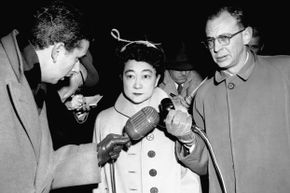Hello ladies and gents this is the Viking telling you that today we are talking about
Tokyo Rose
Iva Toguri d’Aquino looks overwhelmed while being interviewed by journalists before her trial. She had told them she was Tokyo Rose in hopes of collecting an interview fee, little realizing this would lead to her arrest and imprisonment.
Iva Toguri d’Aquino looks overwhelmed while being interviewed by journalists before her trial. She had told them she was Tokyo Rose in hopes of collecting an interview fee, little realizing this would lead to her arrest and imprisonment. During World War II, the Japanese-American voice that emanated from the radio, attempting to demoralize American troops fighting in the Pacific, was referred to as Tokyo Rose.
And that's when things went terribly wrong for an American woman of Japanese descent. Iva Toguri d'Aquino lived in Tokyo, sent there by her family to care for an ailing relative, and was hired by a local radio station for a secretive propaganda plan -- one so secretive, she may not have known she was participating in it.
A British-born major and radio personality named Charles Hughes Cousens had been captured by the Japanese and ordered to produce a radio program that would undermine the Allies' morale. Instead Cousens designed a music-heavy show that would negate the propaganda campaign. D'Aquino and other women were recruited to participate. She took the broadcast name Orphan Ann (an homage to troops "orphaned" by their Allies in the Pacific). Many of her comments came across as humorous rather than ominous.
Despite intelligence reports that Tokyo Rose was not one person, journalists linked the woman known as Orphan Ann to Tokyo Rose. D'Aquino was taken into military custody. Even though the U.S. army found no evidence of her broadcasting secret military information, she was transported to the U.S., where she was tried for treason.
In 1949, a jury found her guilty on one of eight charges that alleged she broadcast news of American ships that were sunk. She was sentenced to 10 years in prison. She was pardoned by President Gerald Ford in 1977 and as always have a chilled day from the Viking.

Comments
Post a Comment